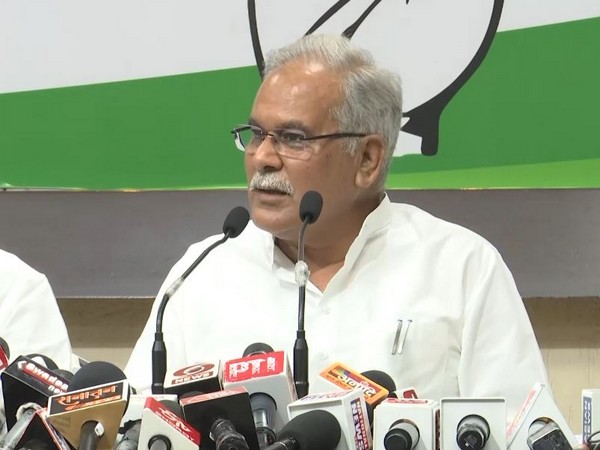New Delhi [India], May 12 (ANI): Former Chhattisgarh CM and Congress leader Bhupesh Baghel on Monday raised questions about the success of Operation Sindoor, a military operation against Pakistan conducted by India in response to the Pahalgam terror attack.
Baghel pointed out that 26 people lost their lives in the recent conflict and questioned whether the operation was successful given the loss of life.
Baghel demanded accountability for the lapse, asking who was responsible for the failure to prevent the loss of life. He questioned the success of Operation Sindoor, citing the failure to capture or neutralize the terrorists involved.
“26 people lost their lives, were those 4 or 5 terrorists caught? If they were not caught, then how can you say that Operation Sindoor was successful? Who is responsible for the lapse?,” said the former Chhattisgarh CM in a press conference.
He criticized the government’s assurance that everything was normal in Kashmir, which led people to visit the region with their families, resulting in the loss of loved ones.
“People went to Kashmir on your (government’s) assurance that everything is normal. People went there with their families and lost their loved ones,” he added.
Meanwhile, the Centre defended its handling of the situation, emphasising the need to protect national security and maintain order in the region.
India’s ‘Operation Sindoor’, launched on May 7 in retaliation for the April 22 Pahalgam terror attack, has marked a significant milestone in the country’s fight against terrorism, achieving multiple strategic objectives while sending a global message of resolve, as per sources.
The operation, which targeted nine terror camps in Pakistan and Pakistan-occupied Kashmir (PoK), not only avenged the attack but also redefined India’s policy against terrorism through a blend of military precision, strategic innovation, and global diplomacy.
India destroyed nine terrorist camps in Pakistan and PoK, targeting key operational centres of Lashkar-e-Taiba (LeT), Jaish-e-Mohammed (JeM), and Hizbul Mujahideen.
The strikes penetrated deep into Pakistan, including Punjab province and high-risk areas like Bahawalpur, where even the US had hesitated to deploy drones.
The operation showcased India’s willingness to intrude into Pakistan’s heartland, attacking hundreds of kilometres inside its territory and signalling that neither the Line of Control (LoC) nor Pakistan’s interior would be safe for terrorists or their supporters.
By targeting both terrorists and their patrons simultaneously, India ended the impunity of Pakistani elements orchestrating terror attacks.
The Indian Air Force, using Rafale jets armed with SCALP missiles and HAMMER bombs, completed the mission in just 23 minutes without any losses, exposing the weaknesses of Pakistan’s air defence systems, the sources said.
India’s ‘Akashteer’ air defence system demonstrated its prowess, intercepting numerous drones and emerging as a globally actionable defence asset.
India’s military actions extended beyond terror camps, with retaliatory strikes on the nights of May 9 and May 10 targeting 11 Pakistani air bases, including Nur Khan, Rafiqui, Murid, Sukkur, Sialkot, Pasrur, Chunian, Sargodha, Skardu, Bholari, and Jacobabad. This marked the first instance of a country attacking the air force camps of a nuclear-armed nation, destroying 20 per cent of Pakistan’s air force infrastructure.
A strike on Bholari Air Base killed over 50 personnel, including Squadron Leader Usman Yousuf and four airmen, while also destroying several fighter jets. Along the LoC, Indian troops responded to Pakistani shelling in the Poonch-Rajouri sector in Jammu and Kashmir by destroying terrorist bunkers and military positions targeting civilians.
The operation highlighted India’s advanced air defence capabilities, ensuring the country’s airspace remained secure despite Pakistan’s retaliatory drone and missile attacks on border regions.
India avoided targeting Pakistani civilian or military infrastructure unrelated to terrorism, adhering to a zero-tolerance policy without escalating into full-scale war. The joint cooperation of the Indian Army, Navy, and Air Force underscored the nation’s growing military synergy.
Globally, the operation shifted the narrative on India-Pakistan relations, delinking it from the Kashmir issue and framing it through the lens of terrorism.
Unlike past conflicts where India faced calls for restraint, this time, many global leaders supported India’s fight against terrorism, reflecting the operation’s precision and moral grounding.
With over 100 terrorists killed and Pakistan’s vulnerabilities exposed, Operation Sindoor has redefined India’s anti-terror strategy, drawing a clear line that terrorism will face a direct and visible response. (ANI)
Disclaimer: This story is auto-generated from a syndicated feed of ANI; only the image & headline may have been reworked by News Services Division of World News Network Inc Ltd and Palghar News and Pune News and World News
HINDI, MARATHI, GUJARATI, TAMIL, TELUGU, BENGALI, KANNADA, ORIYA, PUNJABI, URDU, MALAYALAM
For more details and packages













